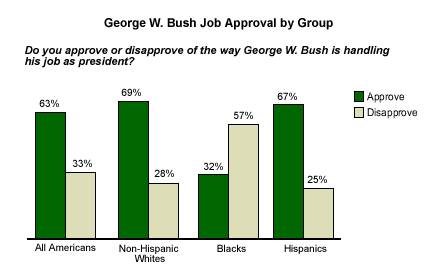Gallup's annual poll on minority relations, which includes larger samples of black Americans and Hispanic Americans, provides unique insight into the views of the largest minority groups in the United States. The groups' views of George W. Bush deserve attention as the president eyes re-election next year. In the 2000 election, Bush had the lowest level of support among nonwhites for a Republican candidate since Barry Goldwater in 1964, according to Gallup's estimate of the presidential vote by groups. And, according to the U.S. Census, Hispanics now constitute the largest minority group in the country. Both Bush and Democratic candidate Al Gore made strong efforts to win Hispanics' support in 2000. The current data indicate Bush is doing quite well among Hispanics nationwide, but is given very low marks by blacks, an overwhelmingly Democratic group.
Bush Approval by Racial and Ethnic Group
By historical standards, Bush is one of the most highly rated presidents. His June 12-18 approval rating of 63% (the latest poll shows him with 61% approval) was below his average to date of 68%, but still above the historical average presidential job approval rating -- 56% -- since World War II.
The Minority Relations poll was conducted June 12-18*, and finds variation in the way racial and ethnic groups evaluate the president. Bush's job approval rating is 69% among non-Hispanic whites, 67% among Hispanics, but only 32% among blacks. A majority of blacks, 57%, disapprove of the job Bush is doing.

When last year's Minority Relations poll was conducted, 70% of Americans approved of Bush, including 74% of whites, 73% of Hispanics, and 41% of blacks. So the general pattern of support by group found in the current data is not new. Although Bush's approval rating has generally declined over the past year, the same pattern of differences among the major racial and ethnic groups in the United States continues to be evident.
Blacks' low ratings of the president are quite general and apply to his ratings on specific issues and policy areas. Approval ratings for Bush among blacks exceed 30% only for his handling of the situation with Iraq (31%), while he receives ratings below 30% approval on foreign affairs (29%), the situation in the Middle East (27%), and the economy (21%).
Roughly 6 in 10 Hispanics approve of Bush's handling of Iraq (62%), the Middle East (60%), and foreign affairs (57%). But only half of Hispanics approve of Bush's handling of the economy, while 44% disapprove.
Gender Gap
The Minority Relations poll found no overall gender differences (62% of men and 64% of women said they approved of the president), but this represents an exception to the general pattern by which women have been slightly less likely to approve of Bush than men are. An aggregate of Gallup Polls in 2003 to date shows Bush averaging 68% approval among men and 60% among women.
Black women tend to rate the president lower than do black men, by a slightly larger gap than exists between all men and all women. The aggregate of 2003 Gallup Polls shows that 35% of black men and 25% of black women approve of Bush's job as president. Hispanic women give Bush generally equal ratings as Hispanic men do on his overall job rating, but the latest poll shows a tendency for Hispanic women to rate him lower than Hispanic men on the specific issues such as the economy and foreign affairs.
*Results are based on telephone interviews with 1,385 national adults, aged 18 and older, conducted June 12-18, 2003, including oversamples of blacks and Hispanics that are weighted to reflect their proportions in the general population. For results based on the total sample of national adults, one can say with 95% confidence that the maximum margin of sampling error is ±3%. [Results for national adults on Questions 1-10 shown here are based on interviews with 1,006 adults, aged 18 and older, conducted June 12-15, 2003. For results based on this sample of national adults, one can say with 95% confidence that the maximum margin of sampling error is ±3%.]
Results for the sample of 821 non-Hispanic whites, aged 18 and older, are based on telephone interviews conducted June 12-15, 2003. For results based on the total sample, one can say with 95% confidence that the margin of sampling error is ±4%.
Results for the sample of 241 blacks, aged 18 and older, are based on telephone interviews conducted June 12-18, 2003. For results based on the total sample, one can say with 95% confidence that the margin of sampling error is ±7%.
Results for the sample of 266 Hispanics (including 12 Hispanic respondents who identify their race as black), aged 18 and older, conducted June 12-18, 2003. For results based on the total sample, one can say with 95% confidence that the margin of sampling error is ±7%. (53 out of the 266 interviews with Hispanics were conducted in Spanish).
